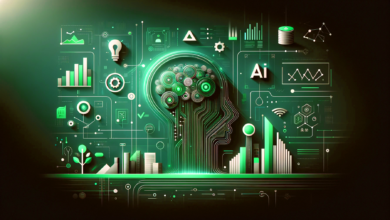
In contemporary rapid-paced world, the appearance of artificial intelligence (AI) has introduced about unheard of modifications in diverse spheres of life. From automating ordinary obligations to permitting groundbreaking innovations, AI has turn out to be ubiquitous, impacting industries, economies, and societies at big. In this newsletter, we will explore strategies and methods to assist people stay applicable and thrive in the age of AI.
As the virtual landscape continues to evolve, adaptability emerges as a cornerstone talent for navigating the complexities of the AI-driven generation. With AI reshaping job roles and industry dynamics, the capability to embody change and pivot as a consequence will become important for staying applicable in an ever-changing environment.
How to Keep Yourself Relevant in the Age of AI
Understanding the Importance of Adaptability
One of the key traits for staying relevant in the age of AI is adaptability. The ability to quickly learn new skills, pivot when necessary, and embrace change is crucial in a constantly evolving environment.
Embracing Continuous Learning
Continuous learning is essential for keeping pace with AI advancements. Whether through formal education, online courses, or self-directed study, investing in learning opportunities allows individuals to acquire new skills and stay ahead of the curve.
Cultivating Soft Skills
While AI excels at tasks requiring technical expertise, it often lacks human qualities such as empathy, creativity, and critical thinking. Cultivating soft skills like communication, emotional intelligence, and problem-solving can set individuals apart in an AI-driven world.
Leveraging AI as an Aid, Not a Threat
Rather than viewing AI as a threat to job security, it’s crucial to see it as a tool that can enhance productivity and efficiency. By embracing AI technologies and leveraging them to augment human capabilities, individuals can unlock new opportunities for growth and innovation.
Networking and Building Relationships
In an increasingly digital world, networking remains a valuable asset for staying relevant. Building meaningful relationships with peers, mentors, and industry professionals can open doors to new opportunities, insights, and collaborations.
Nurturing Creativity and Innovation
Creativity and innovation are inherently human qualities that AI struggles to replicate. By fostering a culture of creativity and encouraging experimentation, individuals can contribute unique perspectives and solutions to complex challenges.
Balancing Technology and Humanity
Maintaining a balance between technology and humanity is essential for staying relevant in the age of AI. While technology offers numerous benefits, it’s essential to remember the importance of human connection, empathy, and ethics in all endeavors.
Enhancing Emotional Intelligence
Emotional intelligence, or the ability to understand and manage emotions, is a valuable skill in today’s workplace. By developing emotional intelligence, individuals can navigate interpersonal relationships, communicate effectively, and lead teams with empathy and compassion.
Remaining Flexible and Agile
In a rapidly changing landscape, flexibility and agility are paramount. Being able to adapt to new circumstances, pivot when necessary, and embrace uncertainty allows individuals to thrive in dynamic environments.
Investing in Future-proof Careers
With Age of AI reshaping industries and job roles, investing in future-proof careers is essential for long-term relevance. Fields such as data science, cybersecurity, healthcare, and renewable energy offer promising opportunities for growth and stability.
Staying Updated with Industry Trends
Staying abreast of industry trends and technological advancements is crucial for remaining relevant in the age of AI. By staying informed about emerging technologies, market shifts, and consumer preferences, individuals can position themselves as valuable assets in their respective fields.
Overcoming Fear of Automation
Overcoming the fear of automation is a crucial step in staying relevant in the age of AI. Here’s a detailed exploration of strategies to address this concern:
Understanding the Nature of Automation
Fear often stems from misunderstanding. Individuals should educate themselves about the capabilities and limitations of automation technologies. Recognizing that automation is designed to augment human capabilities rather than replace them entirely can alleviate unfounded fears.
Embracing Lifelong Learning
Continuous learning is essential for adapting to technological advancements. By upskilling and reskilling, individuals can enhance their value in the workforce and remain competitive in roles that complement automated processes.
Exploring New Opportunities
Rather than viewing automation as a threat, individuals can see it as an opportunity for growth and innovation. By identifying emerging industries and job roles created by automation, individuals can position themselves for new and exciting career paths.
Developing Transferable Skills
Certain skills are less susceptible to automation, such as creativity, emotional intelligence, critical thinking, and complex problem-solving. Investing in the development of these transferable skills can make individuals more resilient to job displacement caused by automation.
Practicing Self-awareness and Reflection
Practicing self-awareness and reflection is a crucial aspect of staying relevant in the age of AI. Here’s a detailed explanation of why it’s important:
Understanding Strengths and Weaknesses
Self-awareness allows individuals to recognize their strengths and weaknesses objectively. By identifying areas of expertise and areas needing improvement, individuals can strategically focus their efforts on skill development and growth.
Effective Decision Making
Self-aware individuals are better equipped to make informed decisions. By understanding their values, motivations, and personal biases, they can navigate complex situations with clarity and confidence, reducing the risk of making impulsive or irrational choices.
Enhanced Emotional Intelligence
Self-awareness is closely linked to emotional intelligence, which is essential for effective communication and relationship-building. By recognizing and managing their own emotions, individuals can navigate interpersonal dynamics more effectively, fostering positive connections and collaborations.
Adaptability and Resilience
In a rapidly changing environment influenced by Age of AI, adaptability and resilience are critical skills. Self-aware individuals are more adaptable to change as they are able to assess their reactions and responses to new situations, allowing them to adjust and pivot as needed.
Personal Growth and Development
Self-awareness fosters a growth mindset, enabling individuals to embrace challenges and setbacks as opportunities for learning and development. By engaging in regular reflection, individuals can track their progress, set meaningful goals, and continuously improve themselves professionally and personally.
Leadership Effectiveness
Effective leadership requires self-awareness. Leaders who understand their own strengths, weaknesses, and leadership styles are better equipped to inspire and motivate their teams, foster a positive work environment, and drive organizational success.
Conflict Resolution
Conflict is inevitable in any workplace, but self-awareness can help individuals navigate conflicts constructively. By recognizing their own contributions to conflicts and understanding others’ perspectives, individuals can facilitate resolution and promote collaboration.
Conclusion
Retaining your self applicable within the age of AI calls for a proactive and adaptable mind-set. Embracing continuous gaining knowledge of, cultivating gentle abilities, leveraging AI as a tool, networking, nurturing creativity, and balancing era with humanity are key techniques for staying ahead in a swiftly evolving landscape.As AI maintains to form the future of work and society, people need to continue to be bendy, agile, and open to new possibilities.
By investing in destiny-evidence careers, staying updated with enterprise trends, overcoming fear of automation, and working towards self-consciousness, people can position themselves for success within the age of AI.While Age of AI gives demanding situations, it also gives significant ability for innovation and growth. By embracing trade and harnessing the electricity of AI to reinforce human abilties, people cannot only stay applicable however additionally thrive in a global in which technological advancements are reshaping the very material of society.
Read More: Hotel Security Tip: Next time you stay at a hotel, turn on your VPN
FAQs
How can I future-proof my career in the age of AI?
Future-proofing your career involves continuous learning, acquiring new skills, and staying updated with industry trends to adapt to the evolving job market influenced by AI.
What soft skills are most important for staying relevant in today’s workforce?
Soft skills such as communication, critical thinking, problem-solving, adaptability, and emotional intelligence are crucial for staying relevant in a workforce increasingly influenced by AI.
Is AI likely to replace human jobs entirely?
While AI may automate certain tasks, it is unlikely to replace human jobs entirely. Instead, it will augment human capabilities, creating new job opportunities and transforming existing roles.
How can individuals overcome the fear of automation and job displacement?
Individuals can overcome the fear of automation by focusing on developing transferable skills, embracing lifelong learning, and exploring opportunities for upskilling and reskilling.
What industries offer promising opportunities for growth in the era of AI?
Industries such as healthcare, cybersecurity, data science, renewable energy, and artificial intelligence itself offer promising opportunities for growth and innovation in the age of AI.











